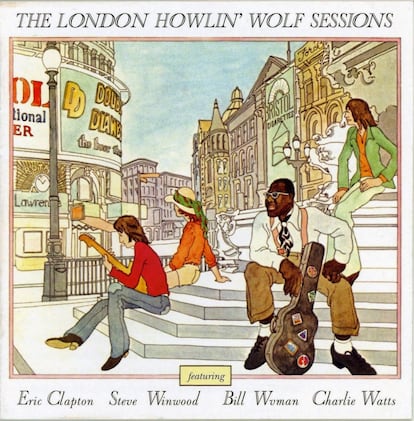Howlin’ Wolf and Muddy Waters: Sitting on top of the world
In the early 1970s, the pioneers of blues and rock and roll began making historic recordings in London. Two albums have just been reissued on vinyl

The oldest readers, surely, have heard many versions of Sittin’ on Top of the World: from the Grateful Dead to Jack White, not forgetting Cream or Bob Dylan. The song is a hypnotic blues tune from 1930 where the protagonist, suffocated by his work, is feeling abandoned. However, he repeats over and over again that he feels like he’s “sitting on top of the world.”
But the canonical interpretation is the one made by Howlin’ Wolf in 1957. The artist sang it again on a 1971 album, The London Howlin’ Wolf Sessions, which inaugurated a curious trend in musical productions: at age 60, he went to England to record with his “musical sons,” students such as Eric Clapton, Charlie Watts, Bill Wyman, Steve Winwood and Ringo Starr. It worked reasonably well, and the following year the experience was repeated with The London Muddy Waters Sessions; the hosts were then Rory Gallagher, Georgie Fame, Mitch Mitchell and, again, Steve Winwood. Both albums have just been reissued on vinyl through Elemental Music.
The London Sessions were not bestsellers – the volumes signed by Bo Diddley and Chuck Berry would later be added – but it was a strategic success for the label, Chess Records. The heir to the founders, Marshall Chess, wanted to expand the market by underscoring that half of all the successful British groups, from the Rolling Stones on down, had been educated listening to Chess records. This, which now seems obvious to us, was not so during the 1970s.
And so audiences missed gems like the psychedelic LPs by Muddy Waters and Howlin’ Wolf, another initiative of Marshall Chess. The one by Howlin’ Wolf carried a message on the cover: “This is the new Howlin’ Wolf album. He does not like it. He didn’t like the electric guitar at first either.” Obviously, the regular audiences for both bluesmen rejected that change, just as flamenco audiences first rejected Camarón’s groundbreaking La leyenda del tiempo.

However, those were carefully made and – yes, let’s use the suspicious adjective – interesting albums. They stood out for the Hendrix-like guitar of Peter Cosey, future accomplice of Miles Davis, and the arrangements by Charles Stepney, the creator of Rotary Connection. In fact, the 1968 Electric Mud was recreated (with rappers added) by Martin Scorsese for his blues series.
In short, the London Sessions helped fuel Howlin’ Wolf and Muddy Waters’ careers in their closing stages. And Marshall Chess left the family record company to run the Rolling Stones’ own label. He lasted seven years. I had the opportunity to interview him a long time later, and he confessed that quitting saved his life: “Not all of us have the constitution of Keith Richards. Neither Muddy Waters nor Howlin’ Wolf could have kept pace with the carnival of drugs, sex and rock and roll that was going on there.”
Tu suscripción se está usando en otro dispositivo
¿Quieres añadir otro usuario a tu suscripción?
Si continúas leyendo en este dispositivo, no se podrá leer en el otro.
FlechaTu suscripción se está usando en otro dispositivo y solo puedes acceder a EL PAÍS desde un dispositivo a la vez.
Si quieres compartir tu cuenta, cambia tu suscripción a la modalidad Premium, así podrás añadir otro usuario. Cada uno accederá con su propia cuenta de email, lo que os permitirá personalizar vuestra experiencia en EL PAÍS.
¿Tienes una suscripción de empresa? Accede aquí para contratar más cuentas.
En el caso de no saber quién está usando tu cuenta, te recomendamos cambiar tu contraseña aquí.
Si decides continuar compartiendo tu cuenta, este mensaje se mostrará en tu dispositivo y en el de la otra persona que está usando tu cuenta de forma indefinida, afectando a tu experiencia de lectura. Puedes consultar aquí los términos y condiciones de la suscripción digital.









































